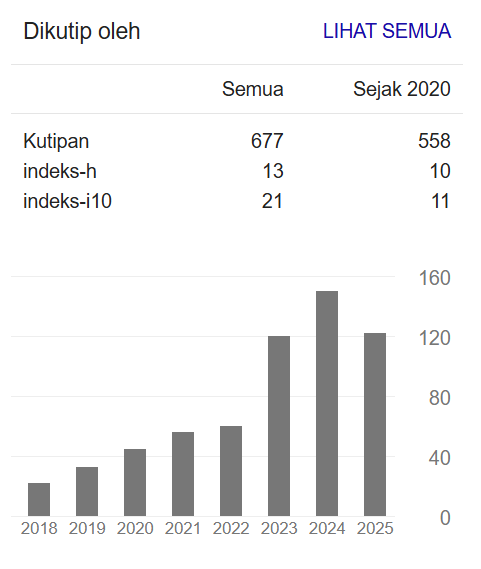AL-KINDĪ’S METAPHYSICS
THE INTEGRATION OF GREEK PHILOSOPHY IN ISLAMIC PHILOSOPHY
DOI:
https://doi.org/10.20871/kpjipm.v11i1.410Keywords:
Al-Kindī, Greek Philosophy, Integration, Islamic Philosophy, MetaphysicsAbstract
This study aims to rectify the reductionist assumption that Islamic philosophy is merely a replication of ancient Greek thought. Specifically, it analyzes how al-Kindī, as one of the pioneers of philosophy within the Islamic tradition, systematically integrated elements of Greek philosophy—particularly Neoplatonism and Aristotelianism—into the conceptual framework of Islamic thought, with a focus on metaphysical aspects of divinity. The central theological themes examined include arguments concerning the existence of God, the essence and characteristics of God, and the concept of the creation of the universe. Using a descriptive-qualitative approach to al-Kindī’s primary texts, particularly Fī al-Falsafah al-Ūlā, this study reveals that al-Kindī did not merely adopt Greek philosophical ideas passively. Rather, he actively selected, reinterpreted, and reformulated these ideas to align with the foundational principles of Islamic teachings. The findings indicate that al-Kindī functioned as more than a translator or conduit of intellectual traditions; he emerged as an innovator who successfully synthesized philosophical reasoning with religious revelation. Another significant finding is al-Kindī’s critical stance toward Greek metaphysical concepts—for instance, his rejection of the notion of creatio ex materia (creation from pre-existing matter) in favor of creatio ex nihilo (creation from nothing), which is more consistent with Islamic theology. This contribution marks the formation of an original and contextual Islamic metaphysical system and paved the way for the more systematic development of Islamic philosophy in subsequent periods. Therefore, this study underscores the importance of repositioning al-Kindī as a central figure in the intellectual history of Islam, one who effectively bridged two major intellectual legacies: Greek philosophy and Islamic thought.
Downloads
References
Adamson, Peter. 2003. “Al-Kindī and the Mu’tazila: Divine Attributes, Creation and Freedom.” Arabic Sciences and Philosophy 13 (1): 45–77. https://doi.org/10.1017/S0957423903003035.
———. 2007. Al-Kindi: Great Medieval Thinkers. New York: Oxford University Press.
Antoine-Mahut, Delphine. 2024. “Eclecticism and Its Discontents: Delphine Antoine-Mahut.” In The Oxford Handbook of Modern French Philosophy, edited by Mark Sinclair and Daniel Whistler, 1–17. Oxford: Oxford University Press.
Arroisi, Jarman, Nur Hadi Ihsan, and M. Najib Abdussalam. 2023. “The Notion of the Soul in Al-Kindi: Building the Epistemological Foundation of Early Islamic Psychology.” Jaqfi: Jurnal Aqidah dan Filsafat Islam 8 (2): 172–91. https://doi.org/10.15575/jaqfi.v8i2.20556.
Atiyeh, George N. 1985. Al-Kindi: The Philosopher of Arabs. Islamabad: Islamic Research Institute.
Bāshā, Muṣṭafā ‘Abd al-Rāziq. 1945. Faylasūf al-‘Arab wa al-Mu‘allim al-Thānī. Kairo: Dār Iḥyā’ al-Kutub al-‘Arabiyyah.
Cicero, Marcus Tullius. 1950. On The Nature of God. Edited by Poteat. Chicago: Jazzybee Verlag.
Druart, Thérèse-Anne. 1993. “Al-Kindi’s Ethics.” Review of Metaphysics 47 (2): 329–57.
Fakhry, Majid. 2000. Islamic Philosophy, Theology and Mysticism. Oxford: One World.
———. 2004. A History of Islamic Philosophy., American Journal of Islamic Social Sciences. New York: Columbia University Press.
Fernández, Antonio Torres. 2023. “Tawhid and Islamic Philosophy: Exploring the Unity of God in Islamic Logic.” An-Nahdlah: Journal of Islamic Studies 1 (2): 85–114.
Fitzmaurice, Redmond Gerard. 1971. “Al-Kindi on Psychology.” Thesis, Montreal: McGill University.
Fuller, B. A. G. 1907. “The Theory of God in Book A of Aristotle’s Metaphysics.” Philosophical Review 16 (2): 170–83.
Groff, Peter S. 2007. Islamic Philosophy A – Z. Edinburgh: Edinburgh University Press.
Habibah, Sulhatul. 2020. “Filsafat Ketuhanan Al-Kindi.” Dar El-Ilmi: Jurnal Studi Keagamaan, Pendidikan dan Humaniora 7 (1): 19–34. https://doi.org/10.52166/dar.
Hafizah, Fithri Dzakiyyah, and Hadi Kharisman. 2024. “Al-Fārābī’s Synthesis: Plato, Aristotle, and The Shaping of Islamic Philosophy.” Kanz Philosophia: A Journal for Islamic Philosophy and Mysticism 10 (2): 357–382. https://doi.org/https://doi.org/10.20871/kpjipm.v10i2.374.
Hamarneh, S. 1965. “Al-Kindī, A Ninth-Century Physician, Philosopher, and Scholar.” Medical History 9 (4): 328–42. https://doi.org/10.1017/S0025727300030982.
Ibrahim, Mohd Radhi. 2001. “Hubungan antara Dhat dan Sifat Allah Menurut Para Mutakallimun.” Afkar: Jurnal Akidah dan Pemikiran Islam 2 (1): 1–16.
Jābar, Muḥammad. 1993. Manzilah al-Kindī fī al-Falsafah al-‘Arabiyyah. Damaskus: Dār Dimashqa.
Jabbār, ‘Abd al-. 1965. al-Muḥīṭ bi al-Taklīf. Kairo: Dār al-Fikr.
Jabbār, al-Qāḍī ‘Abd al-. 1996. Sharḥ Uṣūl al-Khamsah. Kairo: Maktabah Wahbah.
Janssens, Jules. 1994. “Al-Kindi’s Concept of God.” Ultimate Reality and Meaning 17 (1): 4–16.
Kindī, al-. 1948. Kitāb al-Kindī ilā al-Mu‘taṣim Billāh fī Falsafah al-Ūlā. Kairo: Dār Iḥyā’ al-Kutub al-‘Arabiyyah.
Kindī, Abū Yūsuf Ya‘qūb ibn Isḥāq al-. 1999. Rasā’il al-Kindī al-Falsafiyyah. Edited by Muḥammad ‘Abd al-Hādī Abū Riḍah. Kairo: Dār al-Fikr.
Klein-Franke, Felix. 2007. “Al-Kindi.” In History of Islamic Philosophy, edited by Seyyed Hosein Nasr and Oliver Leaman. New York: Routledge.
Marḥabā, Muḥammad ‘Abd al-Raḥmān. 1985. Al-Kindī: Falsafatuhu-Muntakhabāt. Beirūt: Manshūrāt ‘Awīdat.
Murtaḍā, Ibn al-. 1985. al-Munyah wa al-‘Amal. Edited by ‘Iṣām al-Dīn Muḥammad ‘Alī. Iskandariyyah: Dār al-Ma‘rifah al-Jami‘iyyah.
Nadīm, Ibn. 2001. Al-Fihrits. Beirut: Dār al-Ma‘rifah.
Qifṭī, Jamāl al-Dīn al-. 2005. Akhbār al-‘Ulamā’ bi Akhbār al-Ḥukamā’. Beirut: Dār al-Kutub al-‘Ilmiyyah.
Riḍah, Muḥammad al-Hādī Abū. 1950. Al-Kindī wa Falsafatuhu. Kairo: Dār al-Fikr al-‘Arabī.
Riḍā, Taqīy al-Shaykh. 1962. Sīrah Ya‘qūb ibn Isḥāq al-Kindī wa Falsafatuhu. Baghdād: Maṭba‘ah Sulaymān al-A‘ṭalimī.
Sa‘īd, Ibn. 1912. Ṭabaqāt al-Umam. Kairo: Maktabah al-Sa‘ādah.
Shahrastānī, al-. 1934. Nihāyat al-Iqdām fī ‘Ilm al-Kalām. London: Dār al-Fikr.
Sharif, M.M. 1963. A History of Muslim Philosophy. Edited by M.M. Sharif. Kempten: Otto Harrassowitz.
Staley, Kevin. 1989. “Al-Kindi on Creation: Aristotle’s Challenge to Islam.” Journal of the History of Ideas 50 (3): 355–70. https://doi.org/10.2307/2709566.
Tahko, Tuomas E. 2013. “Metaphysics as the First Philosophy.” In Aristotle on Method and Metaphysics. New York: Palgrave Macmillan. https://doi.org/10.1057/9781137367907.
Tirmidhī, Abū ‘Īsā al-. 1998. Sunan al-Tirmidhī. Beirut: Dār Gharb al-Islāmī.
Wahda, Jumrohtul. 2019. “Filsafat Al-Kindi dalam Memahami Teologi.” Manthiq: Jurnal Filsafat Agama dan Pemikiran Islam 4 (1): 35–44.
Wiesner, Hillary Suzanne. 1993. “The Cosmology of Al-Kindi.” Dissertation, Cambridge: Harvard University.
Zarkasyi, Hamid Fahmy. 2006. “Framework Kajian Filsafat Islam.” Tsaqafah 2 (2).
Downloads
Published
How to Cite
Issue
Section
License
Copyright (c) 2025 Harda Armayanto; Adib Fattah Suntoro; Achmad Reza Hutama Al Faruqi, Maria Ulfa

This work is licensed under a Creative Commons Attribution 4.0 International License.





























